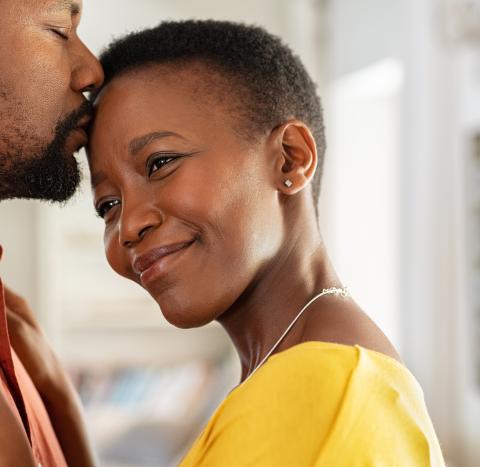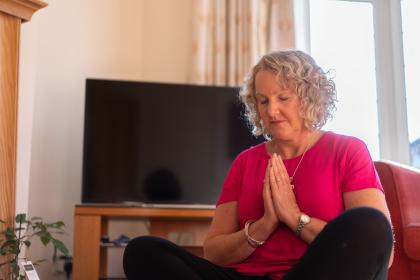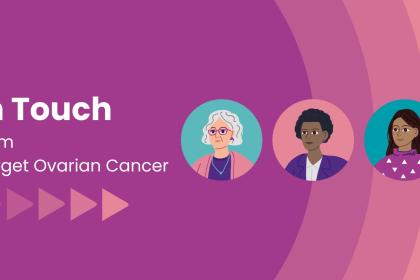A diagnosis of ovarian cancer and its treatment can cause emotional and physical difficulties which can impact on your sexuality, sex life and relationships. It may change how you feel about yourself and your body. It may cause some physical changes that make sex and intimacy (being close to a partner) more difficult. These changes impact everyone differently.
Common questions
Having sex or being intimate during this time can help you feel cared for, loved and secure or sex can feel hard to return to. This is completely understandable and there’s help available.
- I want to have sex but I'm finding it difficult. What can I do?
-
Sex can feel difficult for many different physical, mental and emotional reasons. When sex is difficult it’s common to withdraw from your partner to avoid it and in turn avoid intimacy. Try to talk to your partner, to explain how you’re feeling and what difficulties you’re experiencing.
Problems with desire (our want to be intimate), arousal (being turned on) and orgasm (the peak of sexual arousal) are common. You may want to consider talking to a professional who deals with sexual problems, such as a psychosexual therapist. This should be available to you in your local area through the NHS and you can ask for a referral from your GP or Clinical Nurse Specialist (CNS). Or you can find a private psychosexual counsellor.
- I want to have sex but it's painful. What can I do?
-
Pain during and after sex is often due to vaginal dryness and/or not enough natural lubrication. This is fluid produced by the vagina to keep it moist and reduce friction when having sex. The pelvic floor muscles (the muscles around your bladder, bottom, and vagina) can also tighten, making having sex more uncomfortable. This can happen because of physical causes, but it can also happen when there's emotional distress, anxiety or low sex drive.
Things that can help include:
-
If you have a dry vagina because of hormonal changes, it may be helpful to regularly use a vaginally-applied oestrogen or a non-hormonal vaginal moisturiser. These options may not be suitable for everyone so speak to your CNS about what’s appropriate for you.
-
If you find that you’re not fully aroused during foreplay (intimacy before having sex) and when having sex, using lubricants can help to improve sensation and increase your arousal.
-
Learning to relax your tummy and pelvic floor muscles during sex can help.
-
Trying out different positions to find one more comfortable. Take your time to find out what works for you. Continuing through pain can set up cycles of anxiety for next time, and make pelvic muscles tighten more. Move to something that does feel good and try having sex again another time. This may include any type of touch that you enjoy or that feels good, whether it’s masturbation or kissing or touching a partner.
Macmillan has more information about the impact of pelvic changes on your sex life and how to manage this.
-
- Can you tell me more about lubrication?
-
You can buy lubricants to help with vaginal dryness. The right type and amount can help to make having sex more comfortable. It can also help when using sex toys. There are many different types of lubricants which can be bought in most supermarkets, chemists or online:
-
Water based lubricants are the most common type. They often need to be applied regularly but are safe to use with all latex and silicone products including condoms.
-
Silicone lubricants last longer than water-based lubricants and can be used with latex condoms but not with other silicone products such as sex toys.
-
Oil based lubricants also last longer than water-based lubricants but they're not considered safe for use with latex products, such as condoms, or rubber sex toys.
Whether you’re sexually active or not it can be helpful to regularly use a non-hormonal vaginal moisturiser to help improve vaginal dryness and other vaginal symptoms from your treatment. Names of non-hormonal vaginal moisturisers include Hyalofemme®, Replens™, Regelle® and YES VM®.
-
- I don't want to have sex. What can I do?
-
It’s OK to not want to have sex. There are lots of other ways to be intimate which don’t include penetration (putting a penis, fingers or sex toys into the vagina). If you’re finding the thought of having sex difficult, try to be open and honest with your partner. Talking to each other can deepen your relationship and have a positive effect on intimacy. For instance, you may decide to avoid having sex for a while but concentrate on kissing, cuddling or touching each other.
We can also make ourselves feel good by touching our bodies and giving pleasure to ourselves. Masturbation may also help you feel a greater ownership of your body. After having had doctors examining you, touching yourself may be comforting and help you reconnect with yourself.
Your physical responses in sexual situations can be affected by how you feel about yourself. Sexuality isn’t just about having sex or masturbation. It’s an important aspect of body image and can be affected by low self-esteem or a loss of confidence.
- I'm single and I'm worried about dating. What can I do?
-
You may find it daunting to meet new people or go on dates after diagnosis or treatment for ovarian cancer. Changes to your body may affect your self confidence or you may be struggling to know if, how or when to tell someone new about your diagnosis or treatment. If or when you tell someone new is completely up to you, it's a personal experience. You should share it when you feel comfortable with someone.
These are some things to keep in mind if you're unsure about whether to tell someone new about ovarian cancer:
-
Only tell someone when you want to and if you feel comfortable. It may help to think about exactly what information you want to share.
-
If you're unsure about how to say it, you could try talking it through with your friends or family or writing down what you want to say.
-
Sometimes people don't know what to say or how to react. It may be useful to think of specific things that make you feel supported and giving them clear suggestions for how to best support you. People often want to help and will appreciate being told direct ways in which they can.
These are some resources for dating following a diagnosis of cancer:
-
Cancer Research UK has information about sex and cancer if you're single.
-
It may be useful to speak to other people who have been through similar experiences. Joining a support group or an online community may help you get in touch with other women who can share their experiences of dating after a cancer diagnosis or treatment. Join our online community or search for a local support group through our directory or Macmillan's directory.
-
- My treatment led to early menopause. Is there any specific advice for me?
-
If you’re younger than the age when menopause occurs naturally (45–55 years old) then surgery for ovarian cancer can cause early menopause. We all have oestrogen and testosterone (sex hormones) in our bodies. The sudden loss of testosterone after surgical menopause can cause changes in your sex drive. Also changes in your oestrogen levels can cause vaginal dryness and painful sex.
Hormone replacement therapy (HRT) is a treatment that replaces hormones that your body has lost as a result of surgical menopause (sudden menopause as a result of having surgery). It can help with reducing vaginal dryness and improving your sex drive. It may be suitable for you once your ovarian cancer treatment has finished. HRT can be local (where it’s applied directly to the vagina) or systemic (where it’s absorbed into the blood and flows around the body). Speak to your medical team to see whether HRT may be an option for you.
Sex had changed. As a post-menopausal woman you don’t create the same secretions and I have a lot of difficulty with vaginal dryness. It was very difficult, especially in the early stages post cancer, discussing things like lubrication but now I think I have a more active enjoyment of sex as a post-menopausal woman than I did before my cancer.








